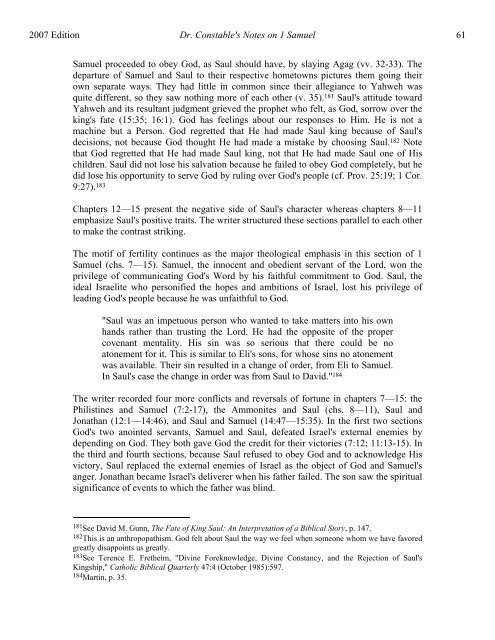1 Samuel - Odessa, Missouri Community of Christ
1 Samuel - Odessa, Missouri Community of Christ
1 Samuel - Odessa, Missouri Community of Christ
You also want an ePaper? Increase the reach of your titles
YUMPU automatically turns print PDFs into web optimized ePapers that Google loves.
2007 Edition Dr. Constable's Notes on 1 <strong>Samuel</strong> 61<strong>Samuel</strong> proceeded to obey God, as Saul should have, by slaying Agag (vv. 32-33). Thedeparture <strong>of</strong> <strong>Samuel</strong> and Saul to their respective hometowns pictures them going theirown separate ways. They had little in common since their allegiance to Yahweh wasquite different, so they saw nothing more <strong>of</strong> each other (v. 35). 181 Saul's attitude towardYahweh and its resultant judgment grieved the prophet who felt, as God, sorrow over theking's fate (15:35; 16:1). God has feelings about our responses to Him. He is not amachine but a Person. God regretted that He had made Saul king because <strong>of</strong> Saul'sdecisions, not because God thought He had made a mistake by choosing Saul. 182 Notethat God regretted that He had made Saul king, not that He had made Saul one <strong>of</strong> Hischildren. Saul did not lose his salvation because he failed to obey God completely, but hedid lose his opportunity to serve God by ruling over God's people (cf. Prov. 25:19; 1 Cor.9:27). 183Chapters 12—15 present the negative side <strong>of</strong> Saul's character whereas chapters 8—11emphasize Saul's positive traits. The writer structured these sections parallel to each otherto make the contrast striking.The motif <strong>of</strong> fertility continues as the major theological emphasis in this section <strong>of</strong> 1<strong>Samuel</strong> (chs. 7—15). <strong>Samuel</strong>, the innocent and obedient servant <strong>of</strong> the Lord, won theprivilege <strong>of</strong> communicating God's Word by his faithful commitment to God. Saul, theideal Israelite who personified the hopes and ambitions <strong>of</strong> Israel, lost his privilege <strong>of</strong>leading God's people because he was unfaithful to God."Saul was an impetuous person who wanted to take matters into his ownhands rather than trusting the Lord. He had the opposite <strong>of</strong> the propercovenant mentality. His sin was so serious that there could be noatonement for it. This is similar to Eli's sons, for whose sins no atonementwas available. Their sin resulted in a change <strong>of</strong> order, from Eli to <strong>Samuel</strong>.In Saul's case the change in order was from Saul to David." 184The writer recorded four more conflicts and reversals <strong>of</strong> fortune in chapters 7—15: thePhilistines and <strong>Samuel</strong> (7:2-17), the Ammonites and Saul (chs. 8—11), Saul andJonathan (12:1—14:46), and Saul and <strong>Samuel</strong> (14:47—15:35). In the first two sectionsGod's two anointed servants, <strong>Samuel</strong> and Saul, defeated Israel's external enemies bydepending on God. They both gave God the credit for their victories (7:12; 11:13-15). Inthe third and fourth sections, because Saul refused to obey God and to acknowledge Hisvictory, Saul replaced the external enemies <strong>of</strong> Israel as the object <strong>of</strong> God and <strong>Samuel</strong>'sanger. Jonathan became Israel's deliverer when his father failed. The son saw the spiritualsignificance <strong>of</strong> events to which the father was blind.181 See David M. Gunn, The Fate <strong>of</strong> King Saul: An Interpretation <strong>of</strong> a Biblical Story, p. 147.182 This is an anthropopathism. God felt about Saul the way we feel when someone whom we have favoredgreatly disappoints us greatly.183 See Terence E. Fretheim, "Divine Foreknowledge, Divine Constancy, and the Rejection <strong>of</strong> Saul'sKingship," Catholic Biblical Quarterly 47:4 (October 1985):597.184 Martin, p. 35.








